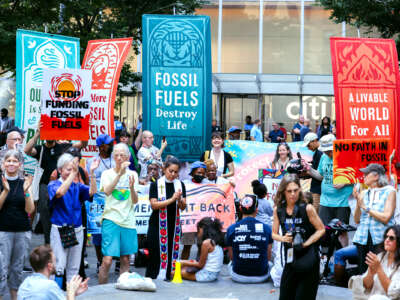GREENWASHING
DNC Climate Panels Offered Empty Rhetoric Instead of Specific PlansAt ExxonMobil-sponsored events on the sidelines of the convention, energy CEOs rehashed fossil fuel misinformation.
August 24, 2024

A man walks by a Democratic National Convention 2024 sign at the United Center on August 18, 2024, in Chicago, Illinois.Kevin Dietsch / Getty Images
The climate crisis didn’t receive much primetime attention during this year’s Democratic National Convention (DNC).
But away from the bright lights of the main stage, a series of low-profile panel discussions have offered a fascinating window into some key obstacles facing the Democrats’ climate agenda — and a lack of concrete policy proposals to overcome them.
Over the course of nearly three and a half hours, Democratic lawmakers, delegates and climate advocates convened for two Environmental & Climate Crisis Council meetings on Monday and Wednesday. The discussions boasted a broad slate of speakers, including progressives like Rep. Ro Khanna (D-California), Rep. Jamie Raskin (D-Maryland), Rep. Maxwell Frost (D-Florida) and Sen. Jeff Merkley (D-Oregon)
“I love the energy here. You’ve got the biggest caucus here at the DNC,” Khanna exclaimed during his address.
Indeed, the energy and enthusiasm in the room were palpable, even when watched via a YouTube livestream. Speakers repeatedly emphasized the climate wins of the Biden-Harris administration, particularly the passage of the Inflation Reduction Act (IRA) and the Justice40 Initiative, an executive order that allocates certain federal funds to marginalized communities overburdened by pollution. A crucial focus was placed on the intersection of climate policy and racial and economic justice. Several Democrats pointed to the fact that, during her time as San Francisco’s district attorney, Vice President Kamala Harris created one of the first environmental justice units explicitly focused on prosecuting polluters.
Related Stor
The climate crisis didn’t receive much primetime attention during this year’s Democratic National Convention (DNC).
But away from the bright lights of the main stage, a series of low-profile panel discussions have offered a fascinating window into some key obstacles facing the Democrats’ climate agenda — and a lack of concrete policy proposals to overcome them.
Over the course of nearly three and a half hours, Democratic lawmakers, delegates and climate advocates convened for two Environmental & Climate Crisis Council meetings on Monday and Wednesday. The discussions boasted a broad slate of speakers, including progressives like Rep. Ro Khanna (D-California), Rep. Jamie Raskin (D-Maryland), Rep. Maxwell Frost (D-Florida) and Sen. Jeff Merkley (D-Oregon)
“I love the energy here. You’ve got the biggest caucus here at the DNC,” Khanna exclaimed during his address.
Indeed, the energy and enthusiasm in the room were palpable, even when watched via a YouTube livestream. Speakers repeatedly emphasized the climate wins of the Biden-Harris administration, particularly the passage of the Inflation Reduction Act (IRA) and the Justice40 Initiative, an executive order that allocates certain federal funds to marginalized communities overburdened by pollution. A crucial focus was placed on the intersection of climate policy and racial and economic justice. Several Democrats pointed to the fact that, during her time as San Francisco’s district attorney, Vice President Kamala Harris created one of the first environmental justice units explicitly focused on prosecuting polluters.
Related Stor
y
News Analysis |
Environment & Health
Activists Are Bringing the Heat to the Banks Funding Climate Crisis
The “Summer of Heat” movement is pushing Citibank to divest from fossil fuels. Will the bank listen?
By Schuyler Mitchell , TruthoutAugust 14, 2024

News Analysis |
Environment & Health
Activists Are Bringing the Heat to the Banks Funding Climate Crisis
The “Summer of Heat” movement is pushing Citibank to divest from fossil fuels. Will the bank listen?
By Schuyler Mitchell , TruthoutAugust 14, 2024
“Vice President Harris and Gov. Tim Walz are committed to bold action to build a clean energy economy, to create good jobs, ensure America’s energy security, reduce emissions, protect public health, support communities in the face of climate disasters, and hold polluters accountable,” said Harris’s chief climate adviser, Dr. Ike Irby. These are admirable goals, and Irby noted that Harris and Walz are “fully committed to building upon this promise.”
How, though, will they do it? That’s yet to be seen.
The Harris campaign has yet to outline its specific plans to tackle climate change. She has already walked back on her previous pledge to ban fracking. And the speeches at these two council meetings focused heavily on past wins, not the future — such as the fact that the United States is currently set to fail to meet carbon emissions targets by 2030.
Senator Merkley, a longtime climate voice on Capitol Hill, was the only speaker on the council panels to reference this reality. “We have been woefully inadequate in addressing carbon in the atmosphere,” he said, emphasizing that “as long as we are increasing fossil infrastructure, taking more fossils out of the ground, burning more carbon, that’s more carbon in the air.” The only way to avoid climate catastrophe, he said, is to “electrify everything” and keep fossil fuels in the ground.
Merkley railed against “natural gas,” which, as he noted, is not natural at all. “Fossil gas is not a bridge,” said Merkley. “Please call it fossil gas, call it methane. There is nothing natural about pulling it out of the ground.”
Earlier this year, President Joe Biden announced a temporary pause on permits for liquified natural gas (LNG) exports, a decision that was blocked by a federal judge in July. But at an event on the sidelines of the DNC hosted by Punchbowl News — and sponsored by ExxonMobil — one Democratic lawmaker claimed that a shift from coal to fossil gas would be an “important transition” to achieve climate goals.
“It is in our national interest, it is in our economic interest, in our national security interest to export LNG, and I just hope they’ll reach that decision soon,” said Rep. Lizzie Fletcher of Houston, Texas, a city at the global epicenter of the fossil fuel industry. Fletcher is a co-chair of the Congressional Natural Gas Caucus and one of the top House Democrats receiving oil and gas dollars, trailing only Texas Rep. Henry Cuellar.
Climate advocates interrupted the event chanting, “Exxon lies, people die” — a reference to the fact that, since 1977, ExxonMobil hid its knowledge from the public that burning fossil fuels contributes to climate change.
Indeed, during the first Environmental & Climate Crisis Council meeting, Representative Khanna called out ExxonMobil by name. “We had the Exxon CEO, Chevron CEO, BP CEO, Shell CEO in front of our committee, and they gave millions of documents, and they admitted that they’d lied to the American public,” said Khanna. “They had the best scientists in the world, but they chose to lie.” Massachusetts Gov. Maura Healey also highlighted that she had sued Exxon for deceptive advertising during her time as attorney general.
Still, that didn’t stop Exxon from getting the top spot at the Punchbowl event — not a shock, given the news outlet’s past reliance on the fossil fuel company to sponsor its newsletters. Vijay Swarup, Exxon’s senior director of climate strategy and technology, told his Punchbowl interviewer that the climate crisis would need to be combated with a so-called “And Equation,” meaning fossil fuels would need to continue to be supplied, and “everybody” — including Big Oil — would “get to be part” of the climate solution.
“I don’t think this industry gets near the credit it needs to get for innovation,” added Swarup.
One of the key innovations in question is carbon capture and sequestration (CCS). Backed heavily by the oil and gas industry, the technology remains unproven at scale and would enable the continued extraction of fossil fuels.
To the chagrin of many climate activists, the IRA included tax credits for CCS projects in its climate spending. In May, dozens of environmental groups sent a letter to the Treasury Department encouraging more stringent oversight. “Carbon capture and storage projects have not effectively reduced climate pollution. They have squandered billions of taxpayer dollars, subsidized the fossil fuel industry, expanded fossil fuel infrastructure, and burdened already disadvantaged communities with even more pollution,” wrote climate advocates. “We urge you to take strong action to avoid wasting more of our tax dollars on a tax break that has been prone to fraud and abuse.”
Representative Fletcher, however, praised CCS during her Exxon-sponsored panel, claiming it “plays a huge role” in reaching climate goals. She expressed the need for “permitting reform” by the Environmental Protection Agency to fast-track carbon pipelines for CCS projects.
At another Exxon-sponsored event, just before the panel with Swarup and Fletcher, Punchbowl hosted chief executives from various energy companies, including Karen Harbert, CEO of the American Gas Association, who called fossil gas the “North Star for the next 5 to 10 years.”
“We grew faster last year than we did the year before,” said Harbert. “And I think it’s because we’re proving we’re reliable, we’re affordable, and we can reduce emissions with natural gas.” In actuality, LNG facilities have been found to leak massive amounts of methane, an atmosphere-warming gas, and recent studies have found that fossil gas could even generate more emissions than coal.
The Punchbowl panels were not part of official DNC programming, but rather one of many corporate-sponsored events, often inaccessible to other press, that occur quietly on the DNC’s sidelines. Still, at an event hosted by a news outlet targeting Washington insiders, and likely attended by Democratic delegates and lawmakers, it is troubling that misleading oil and gas industry talking points were given such a platform.
Taken together, the DNC environment council and Punchbowl panels illuminate key questions for Harris’s still-unknown climate agenda. Will she build on the IRA by taking even more aggressive action to curb emissions and move the nation away from fossil fuels? Or will her agenda fall prey to Big Oil’s faulty “climate solutions,” like CCS and “natural gas”? Only time will tell — but the clock is ticking.
Join us in defending the truth before it’s too late
The future of journalism is uncertain, and the consequences of losing it are too grave to ignore. To ensure Truthout remains fearless, tough, and 100 percent independent, we still need to raise $11,000. Every dollar raised goes directly toward the costs of producing news you can trust.
Please give what you can — because by supporting us with a tax-deductible donation, you’re not just preserving a source of news, you’re helping to safeguard what’s left of our democracy.
This article is licensed under Creative Commons (CC BY-NC-ND 4.0), and you are free to share and republish under the terms of the license. See further guidelines here.

Schuyler Mitchell is a writer, editor and fact-checker from North Carolina, currently based in Brooklyn. Her work has appeared in The Intercept, The Baffler, Labor Notes, Los Angeles Magazine, and elsewhere. Find her on X: @schuy_ler
No comments:
Post a Comment